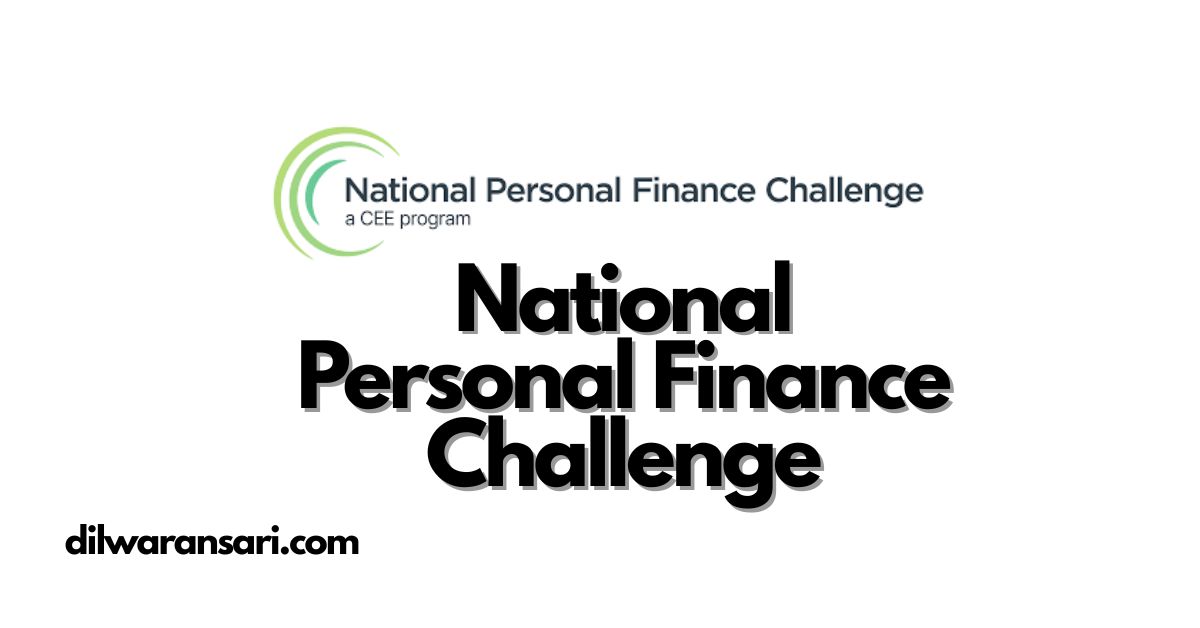The National Personal Finance Challenge is an engaging competition designed to test U.S. high school students on their financial knowledge and decision-making abilities in real-life scenarios. This fun yet competitive event promotes money education while encouraging teens to explore finances as an enjoyable learning experience.
Budgeting, saving, and investing are fundamental skills necessary for future success. Let’s examine how it works, why it matters, and how students can prepare themselves.
What Is the National Personal Finance Challenge?
The Council for Economic Education offers the National Personal Finance Challenge as a free program available to U.S. high school students and teachers. This competition tests skills such as credit management, income forecasting, savings strategies, and risk reduction.
Starting online state-level rounds and progressing through national finals, each team must apply financial knowledge to real family case studies. National finals take place every year, typically in early summer in Georgia, where finalists present their financial plans as well as participate in quiz-style rounds to prove themselves worthy.
Why Does This Challenge Matter?
Financial literacy among teenagers in the U.S. remains shockingly low. Most young adults leave school without basic money management skills such as budgeting, debt control, and long-term planning. This contest provides instruction on budgeting, debt control, and long-term planning to boost teen financial literacy.
Students learn to avoid common financial blunders, such as credit card debt or overspending, through practical education provided through The National Personal Finance Challenge, giving young people an early foundation of economic confidence.
Prepares them for financial independence during college and after.
What Topics Will Students Explore in This Contest?
During this contest, students explore a range of personal finance issues. Here is what they must know to succeed:
- Earning Income: Types of Jobs, Taxes, and Checks
- Spend Wisely: Needs Vs Wants, Budgeting & Planning
- Saving Money: Setting savings goals and building an emergency fund are important ways of saving money.
- Investing Fundamentals: Stocks, bonds, compound interest, and diversification.
- Credit and Debt: Scores, Loans, and Responsible Borrowing
- Manage Risk Effectively: Manage Insurance, Fraud Detection, and Financial Safety
All of these topics reflect decisions every adult must face daily.
How Does the Competition Work?
This competition features three stages.
1. Local and State-Level Rounds
Schools and districts hold local rounds through online tests with multiple-choice questions on finance topics, with top-scoring teams then moving on to compete at the state level. Many states host live or virtual events to crown their victorious squad.
2. National Finals
State winners advance to the national round, held annually in Atlanta, Georgia, in early June. Students are provided a fictional family with complex financial challenges as their challenge scenario.
Each team creates a comprehensive financial plan to assist their family. When presented to a panel of finance and education experts, this plan will be graded on criteria including clarity, accuracy, teamwork skills, and presentation ability.
3. The Quiz Bowl for National Personal Finance Challenge
Top-scoring teams qualify to advance to a quiz-style competition called “Quiz Bowl”, in which speed, accuracy, and financial logic are put under intense test in rapid-fire rounds. This quiz bowl scoreboard determines a national champion.
Prizes and Recognition
Winning teams receive cash prizes and national recognition. First-place teams may receive up to $2,000 per student in scholarship money. In addition, runners-up also earn prizes and trophies in recognition of their efforts.
Finalists receive a fully funded trip to Georgia (excluding travel costs), where they meet other top students from across the nation and connect with top educators from across their schools/teaching units. Furthermore, schools/teachers also receive certificates and media shoutouts.
Who Can Take Part in the National Personal Finance Challenge?
The challenge is open to U.S. high school students in grades 9 through 12, from public, private, and home schools alike. Each team should consist of three or four students plus at least one adult coach.
Coaches typically include teachers or financial literacy advisors. Students must remain within their team throughout all stages of competition and comply with any rules set by their state council or CEE affiliate.
How to Prepare for the National Personal Finance Challenge
Here are a few strategies teams can employ in preparing for the National Personal Finance Challenge:
Investigate Core Topics
Evaluate key concepts related to credit, savings, tax, and investing using classroom materials, online lessons, or prep guides provided by the CEE. Pay special attention to understanding real-world applications instead of simply definitions.
Practice With Case Studies
Use past challenges or create scenarios using made-up families to practice case studies. Think through solutions for budgets, debt, and future goals while remaining transparent, logical, and easy to present when under time pressure.
Improve Teamwork
Each member should play an essential part in the case study. Practice presentations to hone public speaking and clarity, and use feedback from teachers and peers to sharpen your arguments.
Make Use of Online Tools
The Council for Economic Education provides free resources online, such as EconEdLink, Quizle, and Next Gen Personal Finance, that offer flashcards, videos, lesson plans, and sample tests for educators to use with their students.
Benefits Beyond the Contest
Winning can be exciting, but learning new skills through participation in the National Personal Finance Challenge can be far more valuable. Here’s what students gain by joining this challenge:
- Develop Confidence: Gain the ability to make sound financial decisions effortlessly.
- Team Skills: Working collaboratively to solve problems is crucial for team success.
- Public Speaking: Enhance communication abilities necessary for college and work settings.
- Financial Literacy: Learn lessons applicable to daily life.
- College Boost: Enhance your college or scholarship application
These advantages can have lasting repercussions for students long after a competition concludes.
Roles of Teachers and Coaches
Teachers play an essential part in the success of every team. They guide students, provide feedback, assist in preparation, and offer training or lesson plans if desired by interested teachers. Several states also recognize them with awards or special recognition during contests.
Recent Success Stories
Many schools have experienced tremendous successes since participating in the challenge. Previous winners come from Texas, New Jersey, and Nebraska, and often go on to pursue degrees in business administration, economics, or finance.
Some students even use their prize money to start college savings accounts, with one student noting how the challenge helped him “understand money for the first time.” Another said it inspired them to become financial planners themselves.
Are You Ready for the National Personal Finance Challenge?
Let Us Show You How: Here is how you can participate:
Students: Speak to your teacher or counselor about creating a team.
Teachers: Register your school at your state’s finance challenge website.
Parents: Help encourage and assist your child’s learning endeavors by joining and supporting their efforts.
Visit the CEE’s official site for additional tools and dates.
Visit the Council for EconEd to participate. Please click here: https://councilforeconed.org/programs/
Final Thoughts on National Personal Finance Challenge
The National Personal Finance Challenge goes far beyond competing to win; it provides real-life skills that many adults still lack, giving students who take part the knowledge they’ll carry with them for life.
Children gain the joys of competition, friendship, and achievement while simultaneously developing financial literacy. If you’re a student, teacher, or parent looking for ways to support our next generation’s financial education, then budgeting could be the way to do it!
FAQ
1. Is Personal Finance 101 a good book?
Personal Finance 101 is an excellent book for beginners. It covers the fundamentals of money management, including budgeting, credit, saving, and investing, with clear explanations. The book is well written and is an easy read, which enables it to be accessible for anyone new to personal finance.
2. What is the economics and finance competition for high school students?
The National Personal Finance Challenge (NPFC) and National Economics Challenge (NEC) are premier competitions for high school students across the U.S. These tests measure students on aspects of personal finance, macroeconomics, microeconomics, and global economics through case studies, quizzes, and team presentations.
3. What are the three most common risks in personal finance?
The three primary personal finance risks are:
- Income Risk: Loss of employment or an income-producing source could pose a severe threat.
- Investment Risk: Loss of money invested in stocks or other investments.
- Inflation Risk: Over time, inflation reduces your purchasing power and can have serious repercussions for your finances.
4. What are the five areas of personal finance? The five key areas of personal finances include:
- Income– Manage Earnings From Work or Investments.
- Saving – Setting money aside for emergencies or goals.
- Spending – Budgeting and managing expenses.
- Investing – Create wealth through assets like stocks or bonds.
- Protection – By employing insurance and risk management strategies.
5. What is the best finance book for beginners?
Dave Ramsey’s The Total Money Makeover is highly recommended as an introduction to money management for beginners. The book details simple steps for paying off debt, saving money, and building wealth, while Robert Kiyosaki’s Rich Dad Poor Dad takes an alternative, mindset-focused approach.
6. What is the best personal finance program?
Foundations in Personal Finance by Dave Ramsey is a top-rated personal finance program for high school and college students, used widely across schools to cover topics like budgeting, saving, credit scoring, and insurance in an accessible format.



11 thoughts on “National Personal Finance Challenge: A Step Toward Smarter Money Skills”